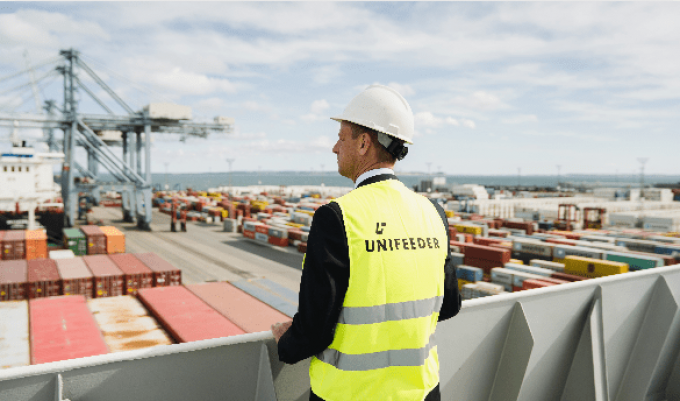CEO Caesar Luikenaar: a few growing pains as WEC Lines eyes new horizons
Dutch shipowner WEC Lines is undergoing “open heart surgery” in its goal to combine shipping ...

With ocean carrier hub & spoke operations in North Europe set to become more reliant on their services, feeder operators are jockeying for position as the ‘green’ feeder of choice.
Unifeeder said today it had signed a long-term charter agreement for two additional newbuild methanol-capable 1,250 teu vessels for delivery in 2026.
Unifeeder has been encouraged to take up its option on the extra ships following an agreement in October to take the first two on long-term charter from Germany-based ship-owning group Elbdeich Reederei.
With the options, one vessel will come from Elbdeich and the second will be owned and managed by Norwegian non-operating owner (NOO) MPC Container Ships .
The NOO confirmed: “Scheduled for delivery in late 2026, the vessel will be under a seven-year time-charter agreement with Unifeeder post-delivery, significantly mitigating residual value risks.”
It is unusual for a feeder operator to commit to such a long-term charter party, given the fluctuating nature of the business, so the deal represents a new direction for the DP World-owned firm.
“The addition of these new vessels reinforces the group’s ongoing efforts to reduce emissions across its network,” said Unifeeder.
CEO Jesper Kristensen said it would “build on our commitment to methanol-powered vessels” and marked “another significant stride towards the green transformation of our fleet and operations”.
“We offer our customers alternatives that align with their sustainability journeys, while making meaningful progress towards our own ambitious decarbonisation goals,” he added.
According to Alphaliner data, Unifeeder operates a fleet of 86 vessels, with a capacity of 138,995 teu, all of which are chartered, and has an orderbook of eight vessels, for 17,024 teu.
Meanwhile, its main competitor, X-Press Feeders, operates 89 ships, with a total capacity of 158,549 teu, of which 40 are owned, and has an orderbook for 15 ships with a capacity of 19,616 teu.
X-Press recently signed a memorandum of agreement with Taiwan’s Evergreen for the ocean carrier to load its containers on the feeder operator’s new dual-fuel, green methanol vessels.
A total of 14 dual-fuel feeder vessels have been ordered by X-Press, slated for delivery from the second quarter this year to mid-2026. They will initially be based at Rotterdam, where X-Press has a contract with Dutch fuel supplier OCI Global for the supply of green methanol.
Given the significant premium in the price of green methanol compared with low-sulphur fuels, feeder operators will need to establish a revised tariff for relay contracts with lines that use the new ‘green’ feeders.
However, according to The Loadstar’s feeder contacts, the initial response by the carriers to a ‘green’ surcharge has been “disappointing”.
Comment on this article